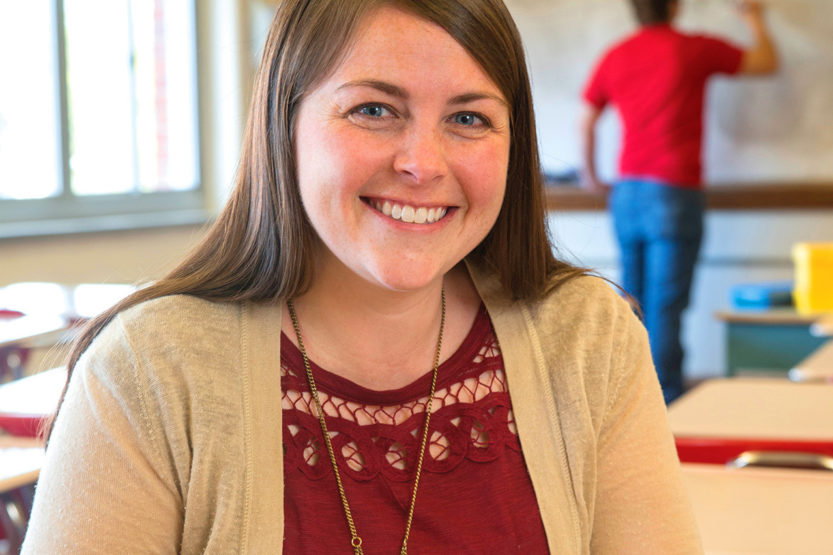Alumni Interview: Danyel Larsen
 “It’s a great honor to have been nominated for the Presidential Award. I hope I win,” says Danyel Larsen, ’04 LAS, who teaches math at Oregon High School (Ill.). “I would love to visit the White House and talk about education with the ‘prez.’” (Image by Lloyd DeGrane)
“It’s a great honor to have been nominated for the Presidential Award. I hope I win,” says Danyel Larsen, ’04 LAS, who teaches math at Oregon High School (Ill.). “I would love to visit the White House and talk about education with the ‘prez.’” (Image by Lloyd DeGrane) One of the best compliments I ever received came from a student who was recommending me for an award. The first line of his letter read, “A great teacher is capable of inspiring love in a field where there once existed fear and dread.”
Many students are intimidated by math. If I can help students get past their fears, if I can help them see that math isn’t abstract, but has applications in athletics and music and their other interests, then most of them do well.
The best way I gain their confidence is by making it possible for them to learn through their mistakes. My students get multiple opportunities to show mastery over the material. If they make mistakes the first time through, they have the chance to fix the errors and learn from those mistakes. Everyone loves this arrangement: students, parents, administrators. Students are willing to try the math because they know there is a safety net.
I grew up in Roscoe, Ill., north of Rockford, Ill., near the Wisconsin border. My parents would tell you that I looked at other colleges and visited other campuses, but the University of Illinois was always my first choice. The reason was simple: I wanted to play in the Marching Illini.
And I did! I played the French horn in high school—and still do, every chance I get. But there are no French horns in marching bands, so I played the mellophone, which has a similar sound. I had a tremendous time. The highlight was when the band went to the Sugar Bowl in New Orleans on New Year’s Day 2002. The team didn’t win, but I really wasn’t in it for the football. To this day, I can’t tell you the first thing about football, except when it’s time to play the fight song. I also played in the basketball band, the Orange and Blues band, the Symphonic band and the Concert band. Sometimes when I look back, I’m amazed at the amount of time we invested in those activities!
One of the great satisfactions of my job is watching my students grow and develop. Every day, I take a few minutes to get to know the kids.
I sort of backed into my career. When I went to school, I didn’t know what to major in, and so I just took courses. After two years, my parents were out of patience. I did best in math and Spanish, but I did like math more, particularly non-Euclidian geometry. I fell into the education track in the same way. My roommate was in the education program, so I followed along. I don’t recommend that approach to finding a career you can be passionate about, but it worked for me.
My first year as a teacher was very difficult, but that is true for almost every teacher. You have to learn how to present your subject, but you also have to learn how to control a classroom. After three years, I was having doubts about whether or not I should stay in teaching, but I resolved to give it one more year in another community, and that made all the difference. The first was a small farming community, which was fine, but the second, in Oregon, Ill., was a little larger, more like the town where I grew up. I felt at home there, and that’s where I’ve stayed.
One of the great satisfactions of my job is watching my students grow and develop. Every day, I take a few minutes to get to know the kids. I greet them at the door, I go to a game after school. It’s the most important thing I do. If they know I care about them as individuals, they will care about what I want them to learn.
There’s a lot of debate these days about holding teachers accountable for the performance of their students. I don’t know if there can be one solution. Some teachers who work in big districts will see a student for just a year, sometimes just one semester. That’s not much time for a teacher to have an impact, particularly on adolescent students. But when teachers see students for two or three years? Yes, it’s fair to measure teachers by student performance.
It’s a great honor to have been nominated for the Presidential Award for Excellence in Mathematics and Science Teaching. I hope I win. I would love to visit the White House and talk about education with the “prez.” I would tell him that National Board Certification needs to be the standard for teaching, rather than the exception. Good teachers reflect on their practice and work to make themselves better because they know that when they improve, their students’ learning also will improve.

